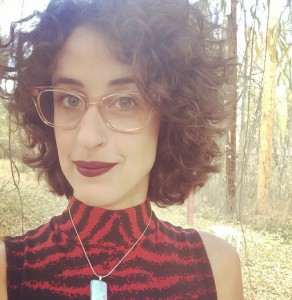from I WRITE TO YOU FROM THE SEA
***
Today everything’s swollen like a sick brain.
The baseboards, swollen. Under-eye skin.
Here are some facts about the sea: when the sky is,
it is very blue. It is nerveless, as the dead nerve soars
over the surface of the stove, burnlessly feeling.
The sea is big and roomless. A big kid holding
a little one by the head as the little one windmills
his arms around in endlessly unthrown punches
is the collective dream of the sea. The sea is not
a machine for giving, though it is so big.
Sometimes we call it mother but it is the sea.
These days there’s less and less of me.
***
We must address the issue of delivery.
Being that I am conspicuously addressless.
Believe it: above us both some birds
go neck-first into weather.
***
Memory clicks like film, and a girl
sure is out far.
She’s building
a collection of objects
to unremember.
The collective unremembering
of a city—its buildings—in party—
this half-thought may depend
on some folding
and unfolding of itself like a wave.
The sea’s distended belly
gets excited from so much tossing
and that’s how waves are made.
The girl’s hair is wet and clumps
and flops in limp curls.
Soon her insides will tire of trying
to stay settled and even
the effort will leave her.
***
It’s hard to know a big thing so exactly.
The shoreline knows what it knows.
I am trying to hold all the words for what I know
in my head even as my head fills
with a fear bigger than what it can hold.
What I’ve learned to call by one name
exceeds itself and becomes another.
I tell you, I used to know it.
I used to be full of salt and bound
by other objects.
Then the speed of the waves made me nervous.
There’s a moment when you’re listening to a sound
repeat itself when you can give in or begin to panic.
Then your memory goes.
***
When I’ve been too long awake sometimes
it takes staring as hard as I can past the boat
to even believe in the water.
Other times I knock against the boat
to be sure where I am is still a kind of land.
Uncertain, who won’t take a little nuzzle
up to the sides of things.
On land people walk around bound
by their impulses.
They push off from them.
***
It matters whether you think of the sea
as the presence of water or as the absence of land.
As a cupboardless bowl or a boatless wreck.
A river with no self-control or where
you find yourself in pain.
***
The talk it’s possible to have about the sea
moves in a line above the sea and does nothing.
The owls. Their sounds.
They rise into relief over the ground
above their prey,
which is being driven further
into the night by a strong smell.
The old road. Your own arm in your hair.
The sea is a hard logic that snaps like a sheet.
Under the sheet you’re dreaming you’re losing
control of the car.
***
The sea is a laboratory of continuing on beyond
when a thing is finished. To move by is. By scape.
When the girl—when the road—
when the animal in the girl on the road—
The ribs of the boat reach out to France,
then touch France.
Sharing is being in a thing another thing is also in
without acting on the urge to leave.
Is it wrong to know a fish you’ve never seen?
To want to be a girl nobody told you of?
***
It still applies, you know.
The universe.
Were I addressing someone else,
a slew of someone elses, I might say
So may the waves apply themselves to you,
and also to you.
For example, even out here
I sometimes feel spontaneously,
dangerously pregnant.
The mind does this, it includes everything.
I sink down into the mind
until I’m stupid with it.
There’s been nothing inside me.
I know because at sea nothing
is easy to identify.
Some rare land days I’d desire
to picture myself
as a boat under your hands.
I know now it couldn’t have been.
Having seen one.
You want to know what there is to be missed
about the world—it’s this, the not recognizing.
***
The number one cause of sea
is other sea.
We crane our necks, a flock
of necks, at it, as it becomes she
then shes.
Its plurality. One’s choice
is simply and only to make more of,
being full of them.
I becomes them, bounded by
the serious
pursuit of more sea.
Other objects,
its gleam rises up out of.
There are flares—there—
that in-the-distance feeling
perpetrated on us by a loss
of object.
By reflection. The boat doubles
over itself,
and we’ve seen others,
know we look like a cross-section of water,
two ink boats folded over.
We know that there’s a second boat,
below,
and upside down.
I’ve carried this image with me
out here, where I will leave it.
biography
